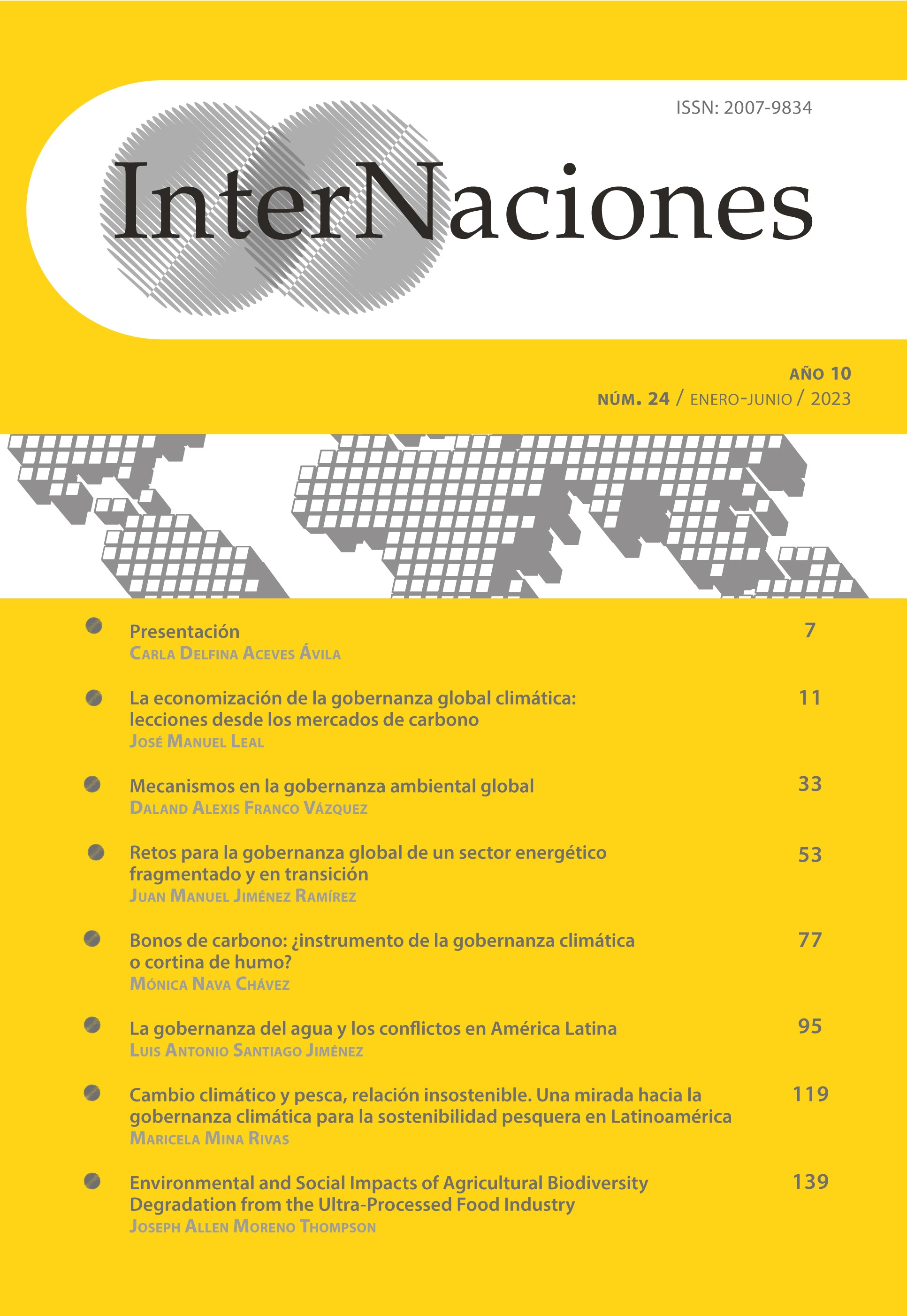Retos para la gobernanza global de un sector energético fragmentado y en transición
DOI:
https://doi.org/10.32870/in.vi24.7233Palabras clave:
gobernanza global, energía, retos, fallas, transiciónResumen
El sector energético plantea innumerables problemas de acción colectiva que los Estados no pueden resolver actuando por su cuenta. Abordar estos problemas transfronterizos requiere alguna forma de gobernanza a una escala más allá del Estado-nación. Sin embargo, con el devenir del tiempo tanto Estados e instituciones internacionales se van visto rebasadas por el tema energético y la coyuntural situación medioambiental. En este trabajo se abordan y analizan los principales retos de una gobernanza energética fragmentada donde continúa privando el interés de las naciones por encima del bien colectivo. En el primer apartado, se presentan algunos conceptos y referentes para entender la complejidad de la gobernanza y su importancia en la política internacional. En la segunda sección se analizan cuáles son los actores principales que intervienen y/dirigen la actual gobernanza energética global. A continuación, se analiza la correlación que existe entre la cuestión energética y el cambio climático, y su respuesta de ambos ante la necesidad de una transición. En la cuarta parte se toma como ejemplo análogo la reunión de la COP26 como ejemplo de las fallas en la gobernanza energética y la coordinación de políticas en este tema. Y por último las conclusiones.Descargas
Citas
Arora, N. K., y Mishra, I. (2021). Cop26: More challenges than achievements. Environmental Sustainability, 4, 585-588.
Biermann, F., y Kim, R. E. (2020). Architectures of Earth System Governance Setting the Stage. En F. Biermann, y R. Kim, Architectures of Earth system governance: Institutional complexity and structural transformation (pp. 1-34). Cambridge, uk: Cambridge University Press.
Biermann, F., y Pattberg, P. (2008). Global Environmental Governance: Ta- king Stock, Moving Forward. Annual Review of Environment and Resources, 38, 277-294.
Bradshaw, M. (2013). Sustainability, Climate Change, and Transition in Glo- bal Energy. En A. Goldthau, The Handbook of Global Energy Policy (pp. 48- 63). Oxford, uk: Wiley-Blackwell.
Cherp, A., Jewell, J., y Goldthau, A. (2011). Governing Global Energy: Systems, Transitions, Complexity. Global Policy, 2(1): 75-88.
Colgan, J., Keohane, R. O., y Van de Graaf, T. (2011). Institutional Change in the Energy Regime Complex. Political Economy of International Organizations Meeting, Zurich, pp. 1-34.
Cordaid. (2021, 16 de junio). Cop26, a success or a failure? Obtenido de Cordaid.com: https://www.cordaid.org/en/news/cop26-a-success-or-a-failure/gclid=cj0kcqjw3v6sbhcsarisacyrrakqw2l4wu_bc0e11yxmlcqnyoumtr0b5vpxxzxap1e74tvo2zoewqaajncealw_wcb
Del Río, B. (2016). La gobernanza global de la energía. Anuario Español de Derecho Internacional, 32, 439-473.
Dubash, N. K., y Florini, A. (2011, septiembre). Mapping Global Energy Governance. Global Policy, núm. 2.
Ebinger, C., y Avasarala, G. (2013). The “Gs” and the Future of Energy Governance in a Multipolar World. En A. Goldthau, The Handbook of Global Energy Policy (pp. 190-204). Reino Unido: Wiley-Blackwell.
Entreculturas. (2021, 15 de noviembre). Cop26. Más fracasos que éxitos. Obtenido de Entreculturas.com: https://www.entreculturas.org/es/noticias/cop26-mas-fracasos-que-exitos
Escribano, G. (2015). Fragmented Energy Governance and the Provision of Global Public Goods. Global Policy, 6(2): 97-106.
Florini, A., y Sovacool, B. K. (2009). Who governs energy? The challenges facing global energy governance. Energy Policy, 37, 5239-5248.
——. (2011). Bridging the Gaps in Global Energy Governance. Global Governance, 17(1): 57-74.
Goldthau, A., y Witte, J. M. (2010). Back to the future or forward to the past? Strengthening markets and rules for effective global energy governance. International Affairs, 85(2): 379-390.
Goldthau, A., Hoxtell, W., y Witte, J. M. (2010). Global Energy Governance: The Way Forward. En A. Goldthau y J. M. Witte, Global energy governance: The new rules of the game (pp. 341-356). Berlín/Washington, dc: Global Public Policy Institute/Brookings Institution Press.
Gouardères, F., y Beltrame, F. (2019, abril). La políca energética: Principios generales. Parlamento Europeo. España: Fichas temáticas sobre la Unión Europea. Obtenido de La política energética: principios generales.
Hirst, N., y Froggat, A. (2012). The Reform of Global Energy Governance.
Grantham Institute for Climate Change, pp. 1-16.
Hobert, R., y Thot, E. (2021, 25 de octubre). Cop 26 Explained: What to know about the un Climate Change Conference. Obtenido de United Nations Fundation: https://unfoundation.org/blog/post/cop-26-explained-whatto-know-about-the-un-climate-change-conference/?gclid=cj0kcqjw3v6sbhcsarisacyrrakxuyk3blj7mnv4bdb9ax9suw2qtedjzrdz-tuy1vzorefhjng3un0aavouealw_wcb
Keohane, R. O. (1978). The International Energy Agency: State influece and trasngoverment poltitics. International Organization, 32(4): 929-952.
——. (1989). International Institutions and State Power: Essays in International Relations Theory. Nueva York: Westview Press/Routledge.
Kuzemko, C., y Bradshaw, M. (2013). Energy Security: Geopolitics, Governance and Multipolarity. En C. Mitchell, J. Watson, y J. Whiting, New Challenges in Energy Security: The uk in a Multipolar World (pp. 22-43). Nueva York: Palgrave MacMillan.
Leoncini, L. (2019). European Union energy trends from 2020 to 2050. KEP energy, pp. 1-23.
Lesage, D., Graaf, T. V., y Westphal, K. (2009). G8’s Role in Global Energy
Governance. Global Governance, 15(2): 259-277.
McGowan, F. (2009). International Regimes for Energy: Finding the Right Level for Policy. En I. Scrase, y G. MacKerron, Energy for the Future. Energy, Climate and the Environment Series (pp. 20-34). Londres: Palgrave.
Mahapatra, R. (2021, 12 de noviembre). Down to Earth. Obtenido de CoP26 report card: Methane’s role in global warming in sharp focus for the first time: https://www.downtoearth.org.in/news/climate-change/cop26-report-card-methane-s-role-in-global-warming-in-sharp-focus-for-thefirst-time-80176
Meyer, T. (2012). The Architecture of International Energy Governance. AmericanSociety of International Law, 106, 389-394.
Millward-Hopkins, J., Steinberger, J., D. Rao, N., y Oswald, Y. (2020). Providing decent living with minimum energy: A global scenario. Global Environmental Change, 65, 102-168.
Onu, Programa para el Medio Ambiente. (2022, 20 de abril). Lo que necesitas saber sobre la Conferencia de las Naciones Unidas sobre el Cambio Climático cop26. Obtenido de onu, Programa para el Medio Ambiente: https://www.unep.org/es/noticias-y-reportajes/reportajes/lo-que-necesitas saber-sobre-la-conferencia-de-las-naciones-unidas
Rosenau, J. N., y Czempiel, E.-O. (1992). Governance without Government: Order and Change in World Politics. Cambridge: Cambridge University Press.
Sanderink, L. (2020). Shattered frames in global energy governance: Exploring fragmented interpretations among renewable energy institutions. Energy Research & Social Science, 61, 1-16.
Serrani, E. (2018). Las “Siete Hermanas”. ¿Competencia capitalista u oligopolio petrolero? Revista de Historia de la Industria, los Servicios y las Empresas en América Latina, 22, 95-116.
Sgouridis, S., Csala, D., y Bardi, U. (2016). The sower’s way: Quantifying the narrowing net-energy pathways to a global energy transition. Environmental Research Letters, 11, 1-9.
Sovacool, B. K., y Florini, A. (2012). Examining the Complications of Global
Energy Governance. Journal of Energy & Natural Resources Law, pp. 235-
Van de Graaf, T. (2013). The Politics and Institutions of Global Energy Governance. Nueva York: Palgrave MacMillan.
Van de Graaf, T., y Colgan, J. (2016). Global energy governance: A review and research agenda. Palgrave Communications, pp. 1-12.
Van de Graaf, T., y Sovacool, B. K. (2020). Global Energy Politics. Cambridge, uk: Polity Press.
Victor, D. G., y Keohane, R. O. (2010). The Regime Complex for Climate Change. Apsa 2010 Annual Meeting Paper, pp. 1-28.
Washington, H., Taylor, B., Kopnina, H., Cryer, P., y Piccolo, J. J. (2017). Why ecocentrism is the key pathway to sustainability. The Ecological Citizen, pp. 35-41.
Welsby, D., Price, J., Pye, S., y Ekins, P. (2021). Unextractable fossil fuels in a 1.5° C world. Nature, 597, 230-234.
Westphal, K. (2006). Energy policy between multilateral governance and
geopolitics: Whither Europe? European Energy Policy, pp. 44-62.
Young, O. R. (2009). Governance for sustainable development in a world of rising interdependencies. En M. A. Delmas, y O. R. Young, Governance for the Environment New Perspectives (pp. 12-40). Estados Unidos: Cambrige University Press.
Zelli, F., Pattberg, P., Stephan, H., y Asselt, H. V. (2013). Global Climate Governance and Energy Choices. En T. H. Policy, Andreas Goldthau (pp. 340-357). Reino Unido: Wiley-Blackwell.
Publicado
Cómo citar
Número
Sección
Licencia
Derechos de autor 2022 Universidad de Guadalajara

Esta obra está bajo una licencia internacional Creative Commons Atribución-NoComercial-CompartirIgual 4.0.
CC BY-NC-SA 4.0 https://creativecommons.org/licenses/by-nc-sa/4.0/



























